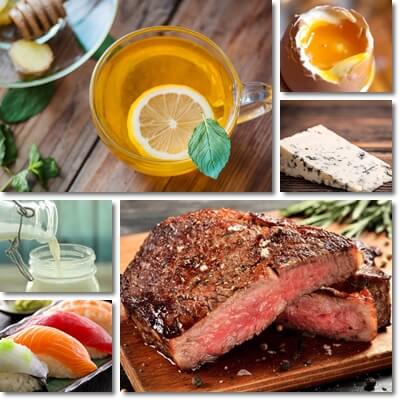Pregnancy is a special time in a woman’s life, but also a time of great change, especially when it comes to the foods you can eat and the foods you need to avoid. Otherwise healthy foods like raw milk, seafood and fish, soft cheeses, herbal teas and herbal supplements or unpasteurized fruit juices hold certain risks for a pregnant woman and are best avoided. As such, if you are pregnant or looking to become a mother, you need to know what foods you can eat safely and what foods you should start avoiding in order to enjoy a happy, healthy pregnancy and baby.
Healthy eating during pregnancy can be quite different from healthy eating outside of it and even the smallest side effects of some foods and beverages can have a huge impact on the evolution of a pregnancy. This is why pregnant women are advised to reconsider the potential negative impact of some otherwise healthy foods and the health risks associated with them. No side effect is too small which is why most doctors will tell you to reduce your coffee intake, give up tea drinking altogether or avoid anything that could potentially support bacteria growth or harbor worms and parasites. If you were wondering, below are the top 14 foods to avoid in pregnancy and the reasons why you need to avoid them:

1) Raw fish, sushi and sashimi
Raw fish and fish preparations like raw sushi and sashimi are a source of worms and intestinal parasites such as the roundworm Anisakis, the human liver fluke Clonorchis sinensis or tapeworms in the genus Diphyllobothrium. These parasites can infect humans and cause allergic reactions, anaphylactic shock, nausea, vomiting, abdominal cramps, cirrhosis, liver or bile duct cancer. They are especially dangerous for pregnant women and can cause a miscarriage. Eating raw fish also comes with a risk of spoilage which leads to the growth of pathogenic bacteria like Listeria, Salmonella, Escherichia coli, Vibrio parahaemolyticus which can be particularly bad for pregnant women.
In addition to gastroenteritis and symptoms such as nausea, vomiting, diarrhea or stomach cramps, these bacteria can even cause sepsis or meningitis. Then there is the issue of mercury content of fish which is a big concern for pregnant women. Methylmercury, aluminum and other heavy metals found in fish, shellfish and other seafood accumulate over time and if a pregnant woman eats too much seafood, the resulting heavy metal contamination could cause a miscarriage, mental retardation or developmental problems in the baby, low birth weight, premature birth or even future infertility or reduced fertility.
2) Raw or undercooked shellfish
Eating raw oysters or undercooked clams or any other shellfish can be a source of bacterial infections in pregnant women which could lead to miscarriage or cause heavy metal contamination which could affect the health of the baby. Accumulation of heavy metals in the body is more likely to occur if you eat more than 2-3 servings of fish and seafood per week, eat fish and seafood from polluted waters or naturally high in mercury. Pregnant women are should avoid eating fish rich in mercury such as tilefish, shark, tuna (especially albacore tuna), swordfish, king mackerel and other larger fish.

3) Live seafood
The practice of eating live seafood like crabs, lobsters, shrimp, octopus or fish poses health risks for pregnant women such as foodborne illness from bacterial infections, worms and intestinal parasites infections or heavy metal contamination.
4) Canned and smoked fish
Lead, aluminum, tin and other elements that make up cans could migrate into the contents and be absorbed in the body, producing heavy metal contamination and affecting both mother and child. Canned fish like tuna are also rich in sodium and can raise blood pressure during pregnancy, increasing the risk of pre-eclampsia. Smoked fish is a source of carcinogens, rich in sodium and can harbor intestinal parasites.
5) Undercooked meat
The main risk associated with eating undercooked meat in pregnancy is contracting a foodborne illness or intestinal parasites such as Toxoplasma gondii. There have been cases of pregnant women who have contracted the parasite from undercooked pork, beef, poultry, mutton and rarely, game. Toxoplasmosis can affect both mother and unborn child and can be life-threatening for the fetus or result in neurological damage, impaired vision and other serious side effects.
6) Raw or undercooked eggs
Pregnant women should only eat well cooked eggs, preferably boiled, poached or scrambled. Fried eggs should be cooked with the lid on or turned on both sides. Both the yolk and the white should be firm when cooked. Raw eggs can carry Salmonella and cause diarrhea, vomiting, abdominal cramps, fever and dehydration, sometimes requiring hospitalization. Considering pregnancy is a relatively sensitive condition, it is important to avoid any and all foodborne illnesses to preserve mother and child health. Also, it is important to discard eggs with a cracked shell and wash your hands and any kitchen utensils used to prepare raw eggs before handling other foods or eating.
7) Unpasteurized milk and cheese
From a nutritional point of view, raw milk and soft cheeses made from unpasteurized milk may contain highly bioavailable nutrients and are especially good for digestive health. But they also hold risks and can cause foodborne illness from bacteria and even parasitic infections. For example, raw goat milk may cause toxoplasmosis, a parasitic infection that could harm the unborn baby. Raw milk and soft cheeses also spoil extremely fast and can support dangerous bacteria such as Listeria monocytogenes which can cause meningitis, encephalitis, sepsis, miscarriage and stillbirth.
Soft cheeses such as brie, feta, Camembert, ricotta, queso fresco or queso blanco are best avoided in pregnancy because they hold the greatest contamination risks. Other serious bacterial infections from unpasteurized milk and soft cheeses include brucellosis caused by Brucella and E. coli infection.
8) Unpasteurized fruit and vegetable juices
Unpasteurized fruit and vegetable juices are bad in pregnancy because they can be sources of bacterial infection and intestinal parasites. Listeria and Escherichia coli infections or parasitic infections with tapeworms could occur. Pregnant women should also avoid adding raw fruits with skin or peel to flavor their water.
9) Unwashed fruits and vegetables and sprouts
Fruits that are harvested after falling on the ground, root vegetables that grow underground or vegetables that rest on the ground are said to carry the most risks. Fruits and vegetables can be contaminated with Escherichia coli, parasites and their eggs, including tapeworms and other pathogenic microorganisms. Using manure to fertilize crops, the presence of livestock or wild animals in or around orchards and crop fields, the use of contaminated water increases risks associated with eating unwashed fruits and vegetables, especially for pregnant women.
10) Some raw honeys
Unless you are allergic to bees and bee products, raw honey is a healthy food. However, pregnant women and everyone really should make sure they get certified honey that is also tested for contaminants. Raw honeys may contain heavy metals from the environment (if the bees feeding ground was a polluted area), bacteria or molds and pose serious health risks.
11) Herbal teas
One thing most doctors recommend pregnant women avoid is herbal teas. This is because the same properties that make herbal teas healthy can hold risks for the evolution of the pregnancy. For example, many herbal teas work by stimulating circulation, whether it’s for detoxification, relaxation, pain relieving or other effects. But this could also mean stimulating circulation in the uterus which could lead to a miscarriage, hence the reason why drinking tea is bad in pregnancy. Another reason to avoid excess tea drinking is the possibility of contaminants such as heavy metals or toxins from the environment which could also cause health problems for both mother and child.
12) Herbal supplements
While it’s good to take your prenatal vitamins, herbal supplements are best avoided in pregnancy. The reason for this is they are not well-regulated and it cannot be certified they contain what the label says. Reports suggest a great deal of herbal supplements either contain different ingredients than those listed on the label or are contaminated with hazardous elements. So it might be best to put off taking you black walnut hull or other obscure supplements while pregnant and nursing your child.
13) Alcohol and caffeine
Irrespective of its supposed benefits, alcohol is not healthy in pregnancy in any amounts so it is best avoided altogether. As for coffee, many experts consider it is safe to maintain a similar intake to that prior to the pregnancy, but nevertheless limit coffee consumption because too much caffeine may raise blood pressure and possibly increase risks of pre-eclampsia in pregnant women.
14) Spicy foods
Spicy foods like wasabi, horseradish, ginger or turmeric as well as supplements made from them such as piperine extracts from pepper, curcumin from turmeric or ginger extracts are bad for pregnancy. When consumed in excessive amounts, ginger for example can increase the risk of bleeding (read more about the side effects of ginger). Spicy foods in general can worsen acid reflux, cause gastritis and even ulcers, skin irritation or abdominal cramps which could affect pregnancy evolution.
What to eat during pregnancy? You can eat anything you like really as long as it’s real food, not processed, but in moderation and well-cooked so as to avoid infection risks. For example, you can have ginger if you like and it is possible it can help with morning sickness, but keep to very small amounts and avoid using it daily. Similarly, milk and dairy are important elements in the nutrition of pregnant women and are good for you as long as they are pasteurized. Fruits and vegetables need to be washed very well, fruit juices pasteurized and eggs and meat well cooked. Eating fish is also good in pregnancy in up to two servings a week, but choose salmon, cod or sardines over tuna or mackerel, avoid canned and smoked fish and remember to boil it well to prevent bacterial and parasitic infections.
